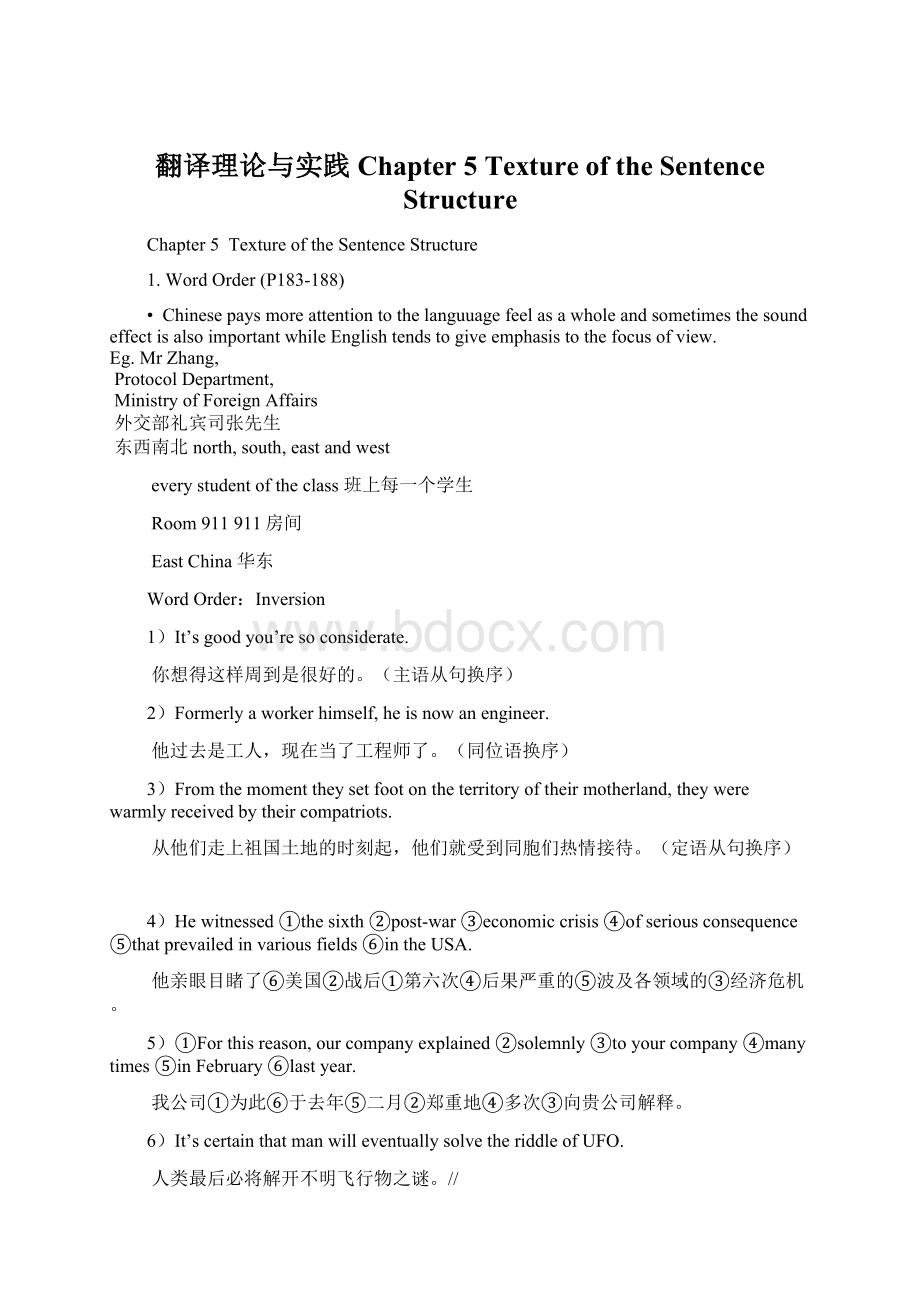翻译理论与实践 Chapter 5Texture of the Sentence Structure.docx
《翻译理论与实践 Chapter 5Texture of the Sentence Structure.docx》由会员分享,可在线阅读,更多相关《翻译理论与实践 Chapter 5Texture of the Sentence Structure.docx(13页珍藏版)》请在冰豆网上搜索。

翻译理论与实践Chapter5TextureoftheSentenceStructure
Chapter5TextureoftheSentenceStructure
1.WordOrder(P183-188)
•ChinesepaysmoreattentiontothelanguuagefeelasawholeandsometimesthesoundeffectisalsoimportantwhileEnglishtendstogiveemphasistothefocusofview.
Eg.MrZhang,
ProtocolDepartment,
MinistryofForeignAffairs
外交部礼宾司张先生
东西南北north,south,eastandwest
everystudentoftheclass班上每一个学生
Room911911房间
EastChina华东
WordOrder:
Inversion
1)It’sgoodyou’resoconsiderate.
你想得这样周到是很好的。
(主语从句换序)
2)Formerlyaworkerhimself,heisnowanengineer.
他过去是工人,现在当了工程师了。
(同位语换序)
3)Fromthemomenttheysetfootontheterritoryoftheirmotherland,theywerewarmlyreceivedbytheircompatriots.
从他们走上祖国土地的时刻起,他们就受到同胞们热情接待。
(定语从句换序)
4)Hewitnessed①thesixth②post-war③economiccrisis④ofseriousconsequence⑤thatprevailedinvariousfields⑥intheUSA.
他亲眼目睹了⑥美国②战后①第六次④后果严重的⑤波及各领域的③经济危机。
5)①Forthisreason,ourcompanyexplained②solemnly③toyourcompany④manytimes⑤inFebruary⑥lastyear.
我公司①为此⑥于去年⑤二月②郑重地④多次③向贵公司解释。
6)It’scertainthatmanwilleventuallysolvetheriddleofUFO.
人类最后必将解开不明飞行物之谜。
//
这一点是可以肯定的。
(拆开名词从句)
7)Heisnothappy,thoughheisrich.
他虽富有,但不幸福。
8)Neverhaveweseensobrightafuturebeforeus!
我们从来都没看见过这样光明的前途。
9)营业员说话要客气,绝对不能“气客”,把客人气跑。
Shopassistantsshouldbepolitetocustomers,notmakecustomersangryandleave.
10)小羊上山吃草。
Thelambwentupthemountainandategrass.
山羊吃上小草。
Thegoathasgotyounggrasstoeat./
Thegoatcannoweatyounggrass.
上小山羊吃草。
Goingupthehill,thegoatategrass.
2.DisjunctiveModifier(P188-190)
DisjunctiveModifier:
separatephrasesorevenindependentclausesarepreferredintheChinesetransaltiontobringouttheirexactmeaningandbeofamorenaturalwordorder.Eg.
1)Shewaspardonablyproudofherwonderfulcooking.
她对自己能做一手好菜感到自豪,这是可以理解的。
2)Theaccidentwasstillhorrifyinglypresentinthebackofhermind.
她还隐隐约约记得那次事故,但是每次回忆起时,仍然会感到毛骨悚然。
3)Sometime,somewhere,someoneisalwaysboundtogomad.Wherethishappens,easilyavailablegunscancatastrophicallyworsentheresult.
某些时候,在某个地方,总有人会生气。
而这个时候如果生气的人手头有枪,后果就更严重,造成灾难。
4)Whenwefeelfacelessandunidentified,itistemptinglyeasytodothingsweotherwisewouldn’t.
在没有人认识我们,也没有人知道我们的身份的时候,我们会情不自禁地想做一些本来不会做的事。
Sometimesattributivescanalsobe“Disjunctive”,eg.
1)Sometimestheyvieweachotherwithregrettablesuspicion.
有时他们互相怀疑,可事后又有点后悔这样。
2)Thenegotiationsweremarkedallthewaybyhagglingoverface-savingdetails.
整个谈判过程一直在为具体细节争论不休,其实只是为了要保住面子。
3.BehindtheParallelStructure:
theConjunctionAnd(P190-202)
AndinEnglishisoftenusedtoconnectswords,phrases,clauses,orsentencesthataretobetakenjointly.
Ingrammaticalstructurethepartsjoinedbyandareparallel.
However,insomecasesthemeaningoftheitemsjoinedbyandmaynotbeparallel.
Eg.
Customer:
Canyougivemearoomandabath?
Hotelclerk:
Icangiveyouaroom,butyouhavetotakeyourownbath.
(“bath”issecondaryinmeaningandrefersto卫生间aspartoftheroom)
Anotherexample:
Ourcompanysuppliesthisnewmachineandallitsparts.
本公司供应这种新机器及其所有部件。
1)Sometimesthewordafterandmodifiesthewordbeforeit
anecklaceandgold
金项链(not项链和金子)
Allthemaidslookedatherwitheyeandenvy.
羡慕的眼神/光
2)Sometimesandemphasizesdifferentqualitiesofsomethingratherthanitsmultitudinousness.
Youcanfinddoctorsanddoctors.
大夫跟大夫可不一样。
(implying“youcanfindamuchbetterdoctorthantheoneyouareseeing”or“thisisreallyagooddoctormuchbetterthantheonesyouhaveseen”,etc.)
3)Sometimesandmeans“very”.
Hewasgoodandangry.
他非常生气。
4)AndinspokenEnglishmeanstoreplacethesignofinfinitiveto.
Comeandhelpmetolifttheseboxes.来帮我抬一下这些箱子。
5)Sometimesand(thetoneofthispattern)showsthespeakerthinkssuchthingsshouldnothavebeendoneornotinsuchaway,soblameisimplied.
Andwhohasgoneandtoldhimaboutit?
谁那么缺德,竟然告诉了他?
You’vegoneandwokenhim.He’ssotiredout.
你怎么搞的,竟然把他吵醒了。
他可是累坏了。
6)Andisusedtoexpressemphasis,thatis,tointroduceadditionalmeaning.
Fartherout,someofthehouseswerestrictlyforshelterandbarelythat.
再往前,(严格地说,)有的房子只能遮遮风雨罢了,甚至连遮风避雨都不顶用。
However,westillhaveshortcomings,andverybigonestoo.
但是我们还有缺点,而且是很大的缺点。
7)Andinnegativesentenceimpliesaconcession.
Eg.IcannotgotoBeijingandnotseetheGreatWall.
我若是到北京去,那就得去看长城。
/我不能去了北京而不去看长城。
Icouldn’tseeyou,andnotloveyou.
见到你,我不可能不一见钟情。
8)Andisoftenusedtoformmetaphors.
Eg.Secretsandedgedtoolsmustbekeptfromchildren.
犹如利器要放在孩子碰不到的地方,秘密也不要让孩子知道。
Onpaintingandfighting,lookaloof.
欣赏油画就好像看打架,要保持一定距离。
TheusagesandtranslationoforasanothercommonconjunctioninEnglish
1)Shedoesn’tneedyourmoneyorsympathy.
她既不需要你的钱,也不需要你的同情。
(joinaseriesofnegation)
2)Acertainamountofcareorpainortroubleisnecessaryforeverymanatalltimes.
对任何人而言,无论什么时候,一定的忧愁、痛苦或烦恼是必要的。
(selection)
3)Putuporshutup.
忍住,要不就闭上嘴。
(meaning“otherwise”)
4)Rainorshine,wearealive.
下雨也罢,天晴也罢,反正我们活着。
(concession)
5)Youknowyouhavetoworkmuchharder,oryou’llbethelasttocatchupwiththeothers.
你知道你必须大大加把劲,不然你就会落在最后跟不上。
(result)
6)Wethinkintermsofimagesthatcoincideorcollideorsticktogether.
我们通过形象思考,这些形象有的重合,有的互相冲突,还有的缠在一起(enumeration)
7)Hemusthavebeenill,orhewouldn’thavemissedthemeeting.
他一定是生病了,否则他不可能不出席会议。
(inference)
4.TheConjunctionWhen(P202-203)
When
1)asanadverb(oftimeinmostcases)
2)asaconjunctiontobringoutanadverbialclauseoftime
3)isoftenusedtointroduceotheradverbialclauses,likeconcession,condition,etc.
Themeaningorthefocusofthesentencewillbedifferentwhenwhenappearsindifferentpositions.Eg.
1)表示突然发生某事或紧接着发生某事,常可译为“…还没/刚刚…就…”,“…正在…忽然…”或“正要…这时…”,主要用于“haddone…when…,bedoing…when…和beabouttodo…when…”这三个句式.Eg.
Ihadhardlyopenedthedoorwhenthemanhitme.
我刚打开门,那个人就打了我一拳。
Iwasreadingabookattentivelywhenanoldfriendcametoseeme.
我正在全神贯注地读一本书,忽然一位老友来访。
Iwasabouttoswimintheriverwhentheguidetoldmetherewasman-eatingfishinit.
我正要下河游泳这时导游告诉我河里有食人鱼。
2)表示对比,常可译为“本该/本可以…却…”
Whyareyouherewhenyoushouldbeatschool?
你本应在上学,怎么会在这儿?
Whydidyoutakeataxiwhenyoucouldwalkherewithinfiveminutes?
你本来五分钟就可以走到这儿,为什么还打的?
3)表示让步,常可译为“既然”或“在…情况下”
HowcantheylearnanythingwhentheyspendalltheirtimewatchingTV?
既然他们把所有的时间都花在了看电视上,又怎么会学到东西呢?
5.RepetitionWordandWordRepetition(P203-207)
TranslationofRepetitiveStructures
•1)Omission
这儿是宝地!
要不是宝地,怎么人越来越多?
Thisisaluckyplace;ifitisn’t,whydomoreandmorepeoplecometolivehere?
•我们能够去掉不良作风,保持优良作风。
Wecangetridofabadstyleandkeepthegood.
•老师是桃花沟的李白、齐白石、钱钟书;老师是桃花沟的杨振宁、钱学森、华罗庚;老师是桃花沟的陶行知、马卡连科……
(1)Intheeyesofthevillagers,he(theteacher)wasnolessthanLibai,QiBaishiandQianZhongshuwhoaretheChinesegreatestlitterateursandartists,nolessthanYangZhenlin,QianXueshenandHuaLuogengwhoaretheChinesegreatestscientists,andnolessthanTaoXingzhiandwhoarethegreatesteducators.
(foreignization:
toremaintheSLculturalelements)
(2)Intheeyesofthevillagers,he(theteacher)wasnolessthanagreatmanofletters,agreatartist,agreatscientistaswellasagreateducator.
(domestication:
toconveytheinformation)
•不管跟人交朋友,还是跟书交朋友,都应该交好朋友。
Oneshouldalwaysliveinthebestcompany,whetheritbeofbooksorofmen.
我们承诺:
追求天人和谐,人际和谐,身心和谐,追求人人相亲,人人平等,天下为公,努力实现我们城市的和谐统一。
(选自“世界历史文化名城市长论坛南京宣言”2006年9月23日)
Wearecommittedtoachievingharmonybetweenmanandnature,inpeople-to-peoplerelationships,andinthedevelopmentofurbansocieties.Wewillworkforfraternity,equality,andjustice.
•2)Substitution
我们的民族将再也不是被人侮辱的民族了,我们已经站起来了。
Ourswillnolongerbeanationsubjecttoinsultandhumiliation.Wehavestoodup.
•“妈,别听王奶奶的!
王奶奶是个老顽固!
”
“Mum,don’tlistentoGrannyWang;she’sanolddiehard/fogy.”
•非洲人民正在为争取非洲的彻底解放进行着艰苦的斗争。
ThepeopleofAfricaarewagingahardstruggletowinthecompleteemancipationofthecontinent.
•你答应了帮助他就应当帮助他。
Youshouldhelphimsinceyouhavepromisedtodoso.
•3)Combination
•中国人民历来是勇于探索、勇于创造、勇于革命的。
ThepeopleofChinahavealwaysbeencourageousenoughtoprobeintothings,tomakeinventionsandtomakerevolution.
•4)PartialRepetition
•新民主主义的文化主张实事求是,主张客观真理,主张理论与实践的一致。
Newdemocraticculturestandsforseekingtruthfromfacts,forobjectivetruthandfortheunityoftheoryandpractice.
重重叠叠山,
曲曲环环路,
丁丁冬冬泉,
高高下下树。
Thehills---rangeafterrange
Thetrails---windingandclimbing
Thecreeks---murmuringandgurgling;
Thetrees---highandlowly.
•5)CompleteRepetition
•他们偷,他们抢,他们欺诈,谁也不敢惹他们。
Theysteal,theyrob,theyswindle;noonedarestocrosstheirpath.
•
•
•6)PluralNounsforRepetition
•战争是民族和民族,国家和国家,阶级和阶级,政治集团和政治集团之间的互相斗争的最高形式。
Waristhehighestformofstrugglebetweennations,states,classesorpoliticalgroups.
•我们的国家现在还是一个很穷的国家。
Oursisstillaverypoorcountry.
•你不愿意落后,她也不愿意落后。
Youdon’twanttolagbehind.Neitherdoesshe.
•要采取果断措施,快出人才,多出人才。
Resolutemeasuresmustbetakentotrainablepeopleingreaternumbersandatafasterrate.
•赶超世界先进水平,关键是时间。
时间就是生命,时间就是速度,时间就是力量。
Incatchingupwithandsurpassingtheworld’sadvancedlevels,timeisthekeyfactor.Timemeanslife,timemeansspeed,andtimemeansstrength.
6.InformationCondensedintheAttributiveModifier(P207-222)
AttributiveModifiercancontainmuchinformationandhelpmakethesentencesuccinct.Whentranslating,weshouldanalyzethesemanticorlogicalrelationshipinordertobringout